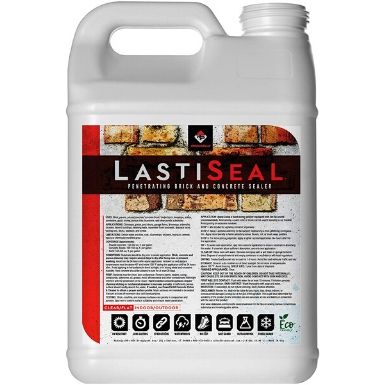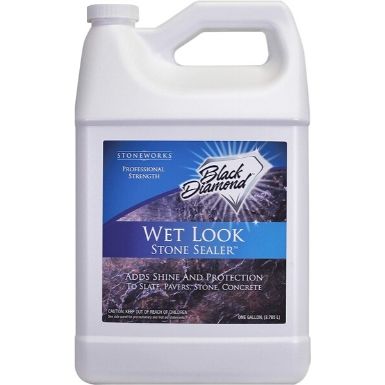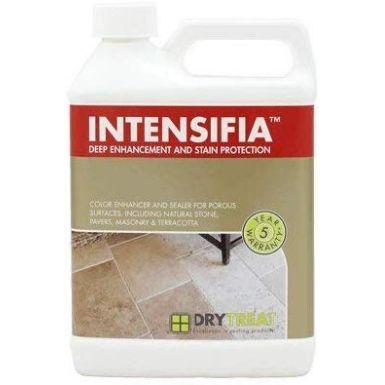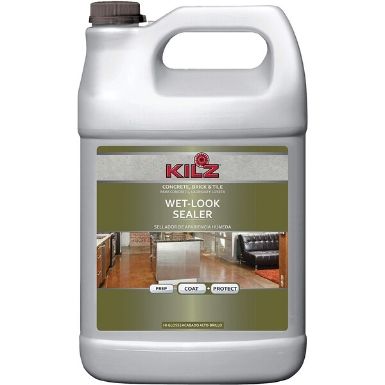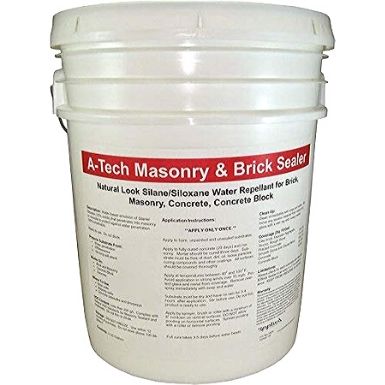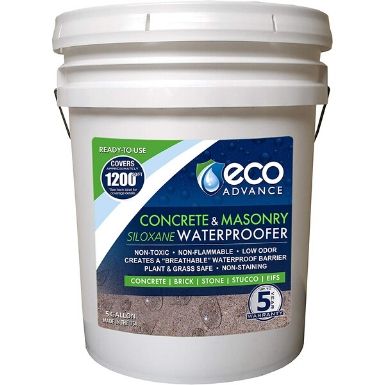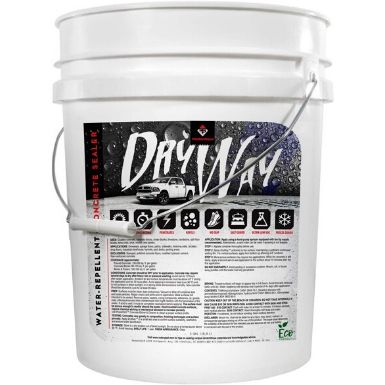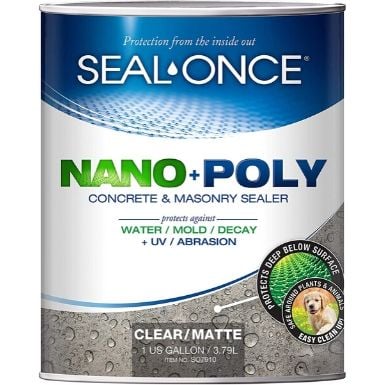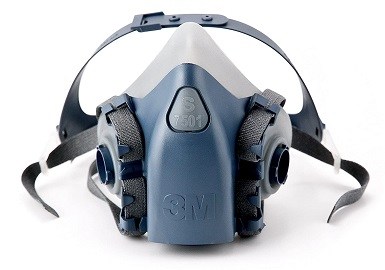Best Brick & Masonry Sealer 2025 – Reviews & Top Picks
-
Pete Ortiz
- Last updated:
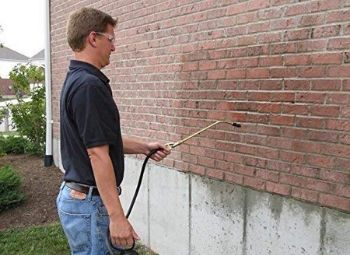

However, a stone walkway can show wear after one bad winter season. This is especially true if you live in an area with a lot of precipitation and cold temperatures. The water seeps into the masonry and weakens the integrity from the inside out. That is not all, however. UV rays, salt damage, mold, mildew, and other substances can damage the appearance of the stone and brick.
Masonry sealers are an excellent investment if you know which one is right for you. To lend a helping hand, we have reviews of the 10 best masonry and stone sealers on the market. Keep reading for details on the application process, finish, formula, and toxicity level. We will also share square footage and shopping tips!
A Quick Comparison Of Our Favorites in 2025
| Rating | Image | Product | Details | |
|---|---|---|---|---|
Best Overall

|
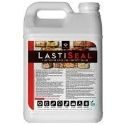
|
LastiSeal 143 |
|
CHECK PRICE |
Best Value

|
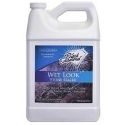
|
Black Diamond Stoneworks |
|
CHECK PRICE |
Premium Choice

|
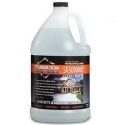
|
Foundation Armor Masonry Sealer |
|
CHECK PRICE |
|
|
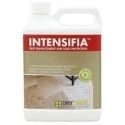
|
Dry Treat Intensifia |
|
CHECK PRICE |
|
|
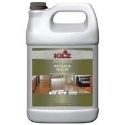
|
KILZ L390201 |
|
CHECK PRICE |
The 10 Best Brick & Masonry Sealers
1. LastiSeal 143 Brick & Masonry Sealer – Best Overall
First is the LastiSeal sealer, which seals concrete, masonry, grout, and wood. It is an eco-friendly option that is non-toxic and non-flammable. You can use it for interior and exterior work to prevent freezing/thawing damage, water stains, cracking, spalling, etc.
This water-based formula can be applied with a sprayer, roller, or paintbrush. You get 2.5 gallons that will cover up to 250 square feet of space. LastiSeal will protect your masonry from UV, salt, water, and other damaging materials. Plus, you won’t slip, and it has an ultra-low VOC. Overall, we think this is the best brick and masonry sealer on the market today.
- Various materials
- Interior/exterior use
- Water-based
- Great protection
- Nontoxic and non-flammable
- Non-slippery
- None come to mind
2. Black Diamond Stoneworks Stone Sealer – Best Value
If you are in the market for an affordable option, the Black Diamond is the way to go. It provides protection from water, UV, chemicals, and other damaging problems. Black Diamond is a great option to protect decorative stonework, but it cannot be used on polished granite or marble.
It will not darken the surface of the masonry, and you can easily apply it with a sprayer, paint roller, or brush. It is VOC-compliant and will cover 5,002 square feet. Black Diamond can be used for interior and exterior work. The fumes can be harder to work with, and it is toxic and flammable. Also, remember that it is not recommended to use when the brick is covered with salt in the winter. Overall, this is the best brick & masonry sealer for the money.
- Great for decorative stone
- Will not darken surface
- Great protection
- VOC-compliant
- Interior and exterior work
- Easy to apply
- Not for polished granite or marble
- Toxic and flammable
3. Foundation Armor Masonry Sealer – Premium Choice
Foundation Armor Masonry Sealer is a slightly more expensive option that is great for concrete and brick surfaces. The formula will protect your surfaces from freeze/thaw damage, layers of salt, water stains, and much more.
This brand will penetrate the substrate up to 2 inches for solid protection. You can apply it with a roller or sprayer, and it comes in a 5-gallon bucket. You will get 200 square feet of coverage per gallon, as well.
Unfortunately, Foundation Armor is a solvent-based mixture that is toxic and flammable. However, mold, mildew, and UV rays will not be a problem, and the formula won’t yellow the surface. You can use it for interior and exterior work, but you must use two coats on porous materials.
- Great protection
- Easy to apply
- Multiple surfaces
- Interior/exterior
- Penetrates 2 inches
- Needs two coats
- Toxic and flammable
4. Dry Treat Intensifia US Enhancer & Sealer
Dry Treat Intensifia US Enhancer & Sealer is a color enhancer best used on patio pavement and other walkways. This formula can be used on residential and commercial properties and will protect the surface from water damage and oil stains. Dry Treat is a great option for preventing yellowing, cracking, peeling, and penetrating the surface for water intrusion and oil marks.
However, it is unsuitable for salt-treated areas. You can use it on a variety of surfaces, including horizontal and vertical substrates. One quart of fluid will cover 150 square feet, depending on the surface. To apply, you can use a brush, roller, or sprayer.
This brand also doesn’t have a sheen, but it will darken the surface of the stone. Also, it is essential to note that Dry Treat is toxic, flammable, and strong smelling, so a well-ventilated space is recommended for indoor use.
- Color enhancer
- Great protection
- Commercial or residential properties
- Horizontal & vertical surfaces
- Easy to apply
- Toxic & flammable
- Strong odor
- No salt-treated areas
5. KILZ L390201 Brick and Masonry Sealer
This next brand is typically known for its stain-hiding abilities, yet in this case, it is known for its sealing ability. Kilz is a high-gloss acrylic-based sealer that protects the surface from water damage, yellowing, spalling, cracking, etc., and prevents stains.
You can use this product on concrete, stucco, tile, brick, and several other substrates. While you cannot thin the sealer, you will get between 250 and 400 square feet of coverage, depending on the porousness of the surface. Kilz can be applied with a brush, roller, or sprayer; however, a sprayer is recommended.
It’s suitable for commercial and residential properties, but it has a strong odor and is toxic and flammable. You also want to apply it to horizontal surfaces only. If you want to enhance your stone and masonry walkways, Kilz is a good choice.
- Great coverage
- High-gloss sheen
- Good coverage area
- Easy application
- Toxic
- Flammable
- Horizontal surfaces only
6. A-Tech Masonry & Brick Sealer
The A-Tech sealer has a natural finish, a low VOC, and repels water to keep brick and stone safe from damage. The silane/siloxane water-based formula penetrates the surface and the joints to keep wind-driven rain at bay.
It is also non-toxic and 100% odorless. You can apply it with a sprayer, brush, or paint roller; however, a sprayer is recommended as the liquid can be difficult to spread. This is an excellent option for stopping efflorescence but is not meant to be used in areas where there could be oil spills or salt damage.
On the other hand, A-Tech is UV-resistant and easy to clean. You get 100 to 150 square feet per gallon, which can be used on commercial and residential surfaces for horizontal or vertical applications.
- Great protection from water damage
- Low VOC
- Non-toxic and no odor
- Commercial and residential
- Harder to apply
- Not meant for salt or oil protection
- Smaller coverage area
7. StoneTech Heavy Duty Exterior Sealer
Moving forward, we have a solvent-based sealer that protects your masonry from water damage, stains, and efflorescence. StoneTech is a heavy-duty option that can be used for interior or exterior work, yet it is better suited for exterior work on brick and stone substrates.
The quart bottle provides up to 250 square feet of coverage, yet it is more difficult to apply. A garden sprayer is recommended, along with a roller, to spread the liquid evenly. You also want to spray away from vertical surfaces since the formula tends to run.
StoneTech WBS12-32 gives a natural finish without a sheen. It is flammable and toxic, but the odor isn’t bad for a solvent-based formula. Also, remember that two coats are recommended, and the temperature needs to be above 55 degrees for the best results.
- Good coverage
- Good protection
- Natural Finish
- Low odor for solvent
- Difficult to apply
- Horizontal and exterior use only
- Toxic and flammable
- Temperature needs to be 50 degrees
8. Eco Advance Concrete/Masonry Sealer
The number eight spot goes to the Eco Advance, an eco-friendly, non-toxic, non-flammable formula. This commercial-grade sealer also has low VOC, low odor, and a cure time of 2 hours. Although it is a commercial-grade formula, residential application is recommended.
Unlike some of the other brands, Eco Advance must be applied with a sprayer. While it doesn’t stain and is safe around grass and other plants, it can be harder to work with as the consistency is hard to spread. However, you can protect concrete, stone, brick, and stucco from water damage.
Eco Advance is a siloxane water-based formula recommended for warmer climates. Depending on the substrate, the 5-gallon bucket will seal up to 250 square feet and has a natural finish that can darken if the application is too heavy.
- Eco-friendly
- Quick cure time
- Non-toxic
- Residential only
- Difficult to apply
- Can darken substrate
- Good for warm climates
9. RadonSeal DryWay Water-Repellent Concrete Sealer
This product is another eco-friendly option that is meant to protect concrete or stone surfaces from water damage, salt stains, freeze/thaw, mold, and mildew. Unfortunately, Dry Wall tends to leave a film and will turn yellow after time. The protection is okay for average use.
The 5-gallon bucket should be applied with a hand sprayer and roller only on level horizontal surfaces. The silane/siloxane formula will only cover 100 square feet for all substrates except untreated concrete, making this a less cost-efficient option.
Also, be aware that this formula is not meant to darken, nor does it have a sheen, but it may change the appearance of the substrate. Dry Wall is the best option for sealing a new driveway in a warmer climate.
- Eco-friendly
- Good for driveways
- Low odor
- Harder to apply
- Can darken appearance
- Not great coverage on stone
- Limited protection
- Not cost-efficient
10. SEAL-ONCE Nano+Poly Concrete & Masonry Sealer
Coming in last place is the SEAL-ONCE protector, which is a water-based polyurethane formula in a clear matte finish. Like the brand above, however, SEAL-ONCE changes the appearance of the substrate and can also get slippery when wet.
It protects the surface from water, mold, and decay damage to concrete and masonry surfaces. Unfortunately, several coats are required to prevent even minor water damage. Although it is eco-friendly, you will also need a paint sprayer to apply this product. The odor from the polyurethane can be pretty strong.
Finally, the one-gallon bucket covers 60 to 80 square feet and tends to leave a film behind. All in all, this is the lowest-ranking product on our list. You are better off choosing one of the brands above for the best sealing protection.
- Eco-friendly
- Requires a sprayer
- Changes appearance of surface
- Strong odor
- Low protection
- Leaves a film
- Low coverage
Buyer’s Guide – Choosing the Best Brick and Masonry Sealer
Deciding on a brick and masonry sealer is difficult since so many factors go into picking the best option. This buyer’s guide will help you select a brick and masonry sealer and how to use it.
Factors to Consider When Buying Brick & Masonry Sealer
Penetration
The most important factor to consider when buying a brick and masonry sealer is the penetration power. The penetration power will allow the product to work deeply through the brick and mortar, allowing it to protect from the weather, efflorescence, or dusting.
Any sealer you select should manage concrete dusting and prevent efflorescence, which is a powdery white substance that can appear on top or below surfaces. The more penetration power the sealer offers, the better it will be at preventing both of these issues.
The Size of the Job
This may sound like a no-brainer, but you must factor in how much sealer you need. Some jobs will require multiple containers of sealer, while others will only need half a gallon.
Health Factors
Brick and masonry sealers can be incredibly toxic. To help protect your health, check out the toxicity, odor level, and other health-related factors of the sealer you use. You may also want to consider products that are more natural and less harmful to the environment.
One specification to look out for is the VOC level. VOC stands for volatile organic compounds, and they are incredibly bad for your health and are regulated by law. Look for lower VOC levels because they will be less toxic and have lower fumes.
Even sealers with low VOC levels will be hazardous if they enter your eyes, mouth, or nose. Always wear protective gear when spraying sealer to prevent harm from occurring.
Intended Surface to Seal
The intended surface you want to seal will largely determine the materials you work with. Consider the surfaces, density, and materials holding the pavers together. Once you have all of this information, check the labels of different sealers to see which one is best for your intended use.
Indoor vs. Outdoor Use
Some sealers can be used inside and outside, but others are only designed for one setting. Consider exactly where you use the sealer and select an option that matches accordingly. If you are using sealer outside, ensure it is safe for the environment.
Finish
After you finish the sealing job, you do not want to look at it and think it looks unprofessional or unkempt. To prevent that, consider the finish you would like for your project. You have your choice between high gloss or matte. Select an option that matches your preferences.
How Brick & Masonry Sealers Protect Your Home
If you are looking for a brick and masonry sealer, you probably know that they protect surfaces in your home, but you might not know exactly what they protect against. Here are the most critical ways that sealers can protect your home:
- Rain and Wind: If it is raining while it is windy, the rain will come in at a horizontal angle, which makes it easier for the rain to penetrate crevices. A sealer will help combat this additional threat.
- Freezing and Thawing: Freezing and thawing can cause property damage to floors and walls, especially in locations prone to heavy winters. A sealer will prevent water from getting into your surfaces.
- Mildew and Mold: Mildew and mold are unsightly, smelly, and aggravating for allergies. Since a sealer will keep water out of the surface, mildew and mold are less likely to grow.
- Spills: Accidents and spills are a fact of life, and they can be impossible to clean properly if they get into the nooks and crannies of a wall. The sealer ensures the spill stays outside the surface, making cleaning easier.
How to Use Brick & Masonry Sealer
1. Prepare the Surface and Yourself
Before applying the sealer, clean off the surface with a power washer and let it dry completely. Pick off old paint, pull away vines, and remove anything else that might be in the way as needed. Dress in protective gear to prevent the toxic materials from damaging your body. This includes goggles, gloves, and a mask.
2. Spray Sealer on the Intended Surface
After waiting about a day for the surface to dry, fill up the pump sprayer with your sealer of choice and spray it onto the material. Be sure to spread any runs or drips while they are wet with a paint roller. Allow the sealer to dry however long the instructions say before adding a second coat.
3. Clean out the Sprayer
After sealing your surface, use soapy water or mineral spirits to clean out the sealer from the pump sprayer. You may also want to read the manufacturer’s instructions for other cleaning tips.
FAQs on the best brick sealer
Why do I need a sealer?
Like any other material, concrete and rocks are subject to damage, especially water damage. Their porous structure allows water to seep in. A sealer will seal moisture out of the surface and protect the material from water or moisture-related damage.
How do sealers work?
It may be helpful to think of a sealer as the waxy coating on the outside of plants. The coating allows raindrops to wick off the plant and roll off the leaves.
Sealers work the same way. They add an additional coating to the surface to prevent water and moisture from penetrating the porous materials. Some sealers penetrate the pores and tiny cracks to further protect from water damage.
Are sealers dangerous?
Sealers are made from toxic materials. Wear special protective gear when applying the sealer, and stay away from it while it is drying. Cover any plants around the surface and remove any animals from the vicinity. Once dried, the sealer should not pose any more health risks.
Conclusion
If you are ready to seal and protect your masonry and stone surfaces, your best bet is our number one choice. The LastiSeal 143 Brick & Masonry Sealer can add a layer of protection against water, UV, and any other damage that may occur. If you prefer a more affordable option, the Black Diamond Stoneworks 679773003916 Stone Sealer has the best bang for the buck.
If you have more concrete than stone on your property, take a look at the best concrete sealers available. You can find all the information you need to seal and protect your concrete surfaces. Otherwise, we hope you have enjoyed this review of the best brick and masonry sealers.
See also: 3 Types of Concrete Sealers (with Pictures)
Featured Image Credit By: A-Tech Masonry & Brick Sealer, amazon
Contents

